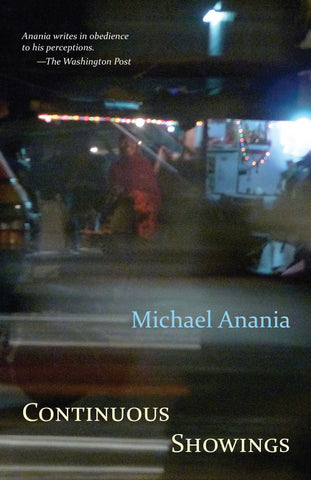Continuous Showings by Michael Anania
With Anania’s familiar, quick movement from perception to the precise but often kinetic image and his extraordinary musicality, Continuous Showings explores a wide range of continuities, from the persistence of tribal culture and language in Mexico to the experience of a fifties movie with Sinatra and Doris Day, from Newton’s alchemical encounter with the New World to the coincidence of science and Dadaism in Paris in 1922, from lute music to jazz. The collection’s final section, the award-winning “Omaha Appendices,” returns to the setting of Anania’s early poetry and fiction to examine the tragicomedy of Italian-American life in the Midwest.
He makes melody and sentence and sight his three primary colors, and he names them in his poems while simultaneously using them to mark the sharp edge—the precise and delicate edge—of his seeing and sentencing. His evokes the jazz and classical masters (and all else) with the melody of his sentences dropping down the page through the clean-edged lines of the poem. With grace he evokes the everyday lived reality of early and mid-twentieth-century years—his Omaha family, rough times, and gangsters, classic American films.
—Reginald Gibbons
Devoted and elegant in his attempt to find meaningful richness in life, the poems in Michael Anania’s new collection, Continuous Showings, imaginatively unfold as a series of continuously playing movies that someone, sometimes himself, will see. Meditative narrative projects Anania’s world—as film, as painting. He seems to rove everywhere, cover everything. The poems leave one having seen, felt, discovered so much. Very beautiful.
—Diane Wakoski
Anania’s precursors include Ezra Pound, William Carlos Williams and Charles Olson. Like Robert Creeley, the poet he most resembles, he is interested primarily in the articulation of consciousness.… One admires the mind at work in his poems.
—The New York Times Book Review
It is hard to think of a contemporary poet who demands more of his own work than Michael Anania. What stands out is the scope and complexity of what is attempted and the grace with which Anania is able to accomplish it.
—Booklist






